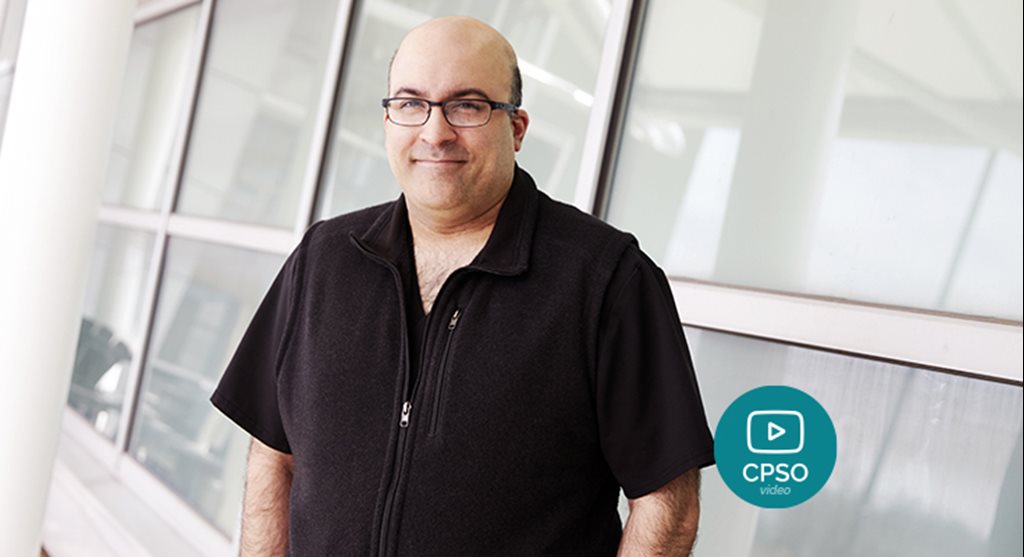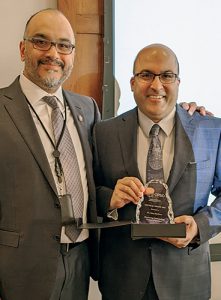
Council Award Recipient: Dr. Alim Pardhan
Dr. Alim Pardhan speaks of medicine — and health care delivery itself — as a team sport. His own “teammates” in medicine see him as an all-star clinician, enthusiastic coach, inspiring role model, and one who shows grace under pressure and respect towards all.
At its meeting in March, CPSO Council recognized Dr. Pardhan’s significant contributions to medicine with the presentation of its Council Award.
Dr. Pardhan has worked clinically as an emergency physician at Hamilton Health Sciences and McMaster Children’s Hospital since 2009. He has served as the Program Director of the McMaster Royal College Emergency Medicine program since 2014. Since 2013, he has also been the site lead for the Hamilton General Hospital emergency department, a level-1 trauma centre and tertiary-care teaching site.
“Dr. Pardhan exemplifies the physician you’d want to care for someone you love if they were sick,” says Dr. Jennifer Clara Tang, an emergency physician and assistant clinical professor at McMaster University, in nominating Dr. Pardhan for the Council Award. “The emergency department can be a challenging environment, with high-pressure decisions and patients often presenting on the worst day of their lives. The usual difficulties have been magnified by COVID-19, but Dr. Pardhan has risen to the challenge. Knowing that your physician leader supports and advocates for your safety and patient safety during these dark days has been a balm.”
In keeping with his team approach to care, Dr. Pardhan is always on the lookout for incorporating different knowledge and skills sets. For example, he helps build bridges between his hospital’s addictions medicine program and emergency department to improve emergency care in a community where opioid overdoses and deaths have risen to three times the provincial average. He also works to incorporate expertise from providers that support people who have experienced sexual assault and domestic violence into emergency medicine. A collaboration with the local shelter system and correctional facilities helps deliver seamless emergency care for people residing in these places, which proved especially valuable when shelters were initially not admitting those with pending COVID-19 results.
Dr. Pardhan is also the program director for the emergency medicine residency program at McMaster and he describes teaching as the best part of his job. His admiration for the quality and intelligence of residents is a motivator for ensuring he keeps up to date with advances in science and medical knowledge. “Education is a fulfilling experience for a physician,” he says. “It helps to stave off burnout.”

Colleagues point to an unflappable nature that is both reassuring and contributes to quality patient care. “When I hear Dr. Pardhan's voice on a call for a consultation or for a learner concern, no matter what time of day or night, however serious the situation, I know the interaction will always be positive,” says colleague Dr. Quang Ngo. “He earns so much respect at Hamilton Health Sciences because he gives respect so freely.”
Below we speak to Dr. Pardhan. We also have a video of his remarks 🎥 when he accepted the award at the March meeting of Council at the end of the article.
Why did you choose emergency medicine?
I was one of those medical students who liked everything. I did my obstetrics rotation and thought, ‘Wow, that was cool.’ I went on and did internal medicine, and had the same reaction. I really liked everything. And in the end, I narrowed it down to emergency medicine and rural family medicine because they are two specialties where I would do a bit of everything. That is, I could be involved in all the different aspects of medicine, taking care of patients from the whole spectrum, both young and old, and all ages in between, from relatively minor conditions to people who are critically unwell. Ultimately, I landed on emergency medicine as I wanted to work primarily in the ED in an urban, high acuity environment.
You’ve been credited for your efforts to support women in your workplace. How is this best achieved?
I work in an environment where many colleagues and trainees are women. It is clear both anecdotally and in the literature that there are inequities in how women are treated in both medicine and in health care more broadly. I want everyone to be treated fairly and equitably, whether it be in terms of working conditions, pay or opportunities for advancement. I try my best to listen to the challenges my colleagues face and try to address them where I can. Where I can’t, I will try to use whatever influence I have to advocate for changes that will result in a level playing field.
Colleagues speak about your belief in civility in medicine. How does this benefit the workplace, as well as the patient?
My belief in the team concept in medicine is doubly true in the emergency department. I rely on the team to let me know when there is a problem. When a patient is not doing well, the first to notice is usually the bedside nurse. So, I don’t want there to ever be a barrier for that nurse to tell me there is a problem with a patient. Further, when making decisions about patient care, if the team trusts you, they will tell you if they think you may be making a mistake or if they have an observation that is important. There is good data which show that if you are kind and patient as a physician, then people will come and talk to you and mistakes can be avoided.
Civility and trust are also important in medical education. If a resident is facing a challenge that could disrupt their education, you can only address it if you know about it.
How do you keep a medical team motivated and engaged in a prolonged pandemic?
What I have tried to do throughout the pandemic is keep everyone informed. In health care, there is no one group of professionals carrying this on their own, whether physicians in different specialties, as well as our nursing colleagues, pharmacists, social workers and other team members. Everyone is struggling with a pandemic that is dragging on for years. When I have information, I share it broadly. I try to listen when colleagues are telling me what is working well and where we need a better plan and, where possible, act on the suggestions that we have received. A lot of the plans we put in place were heavily informed by members of our team who identified gaps. When people feel that their input is listened to by leadership, they are more likely to stay and be effective in their role because they know you have their back.
















